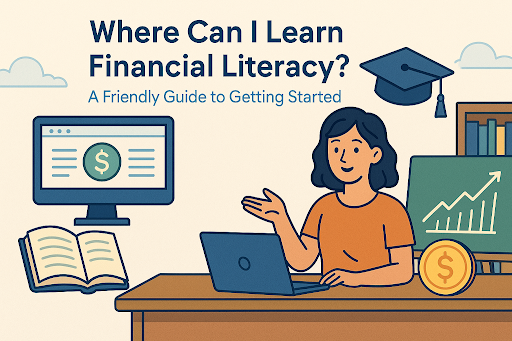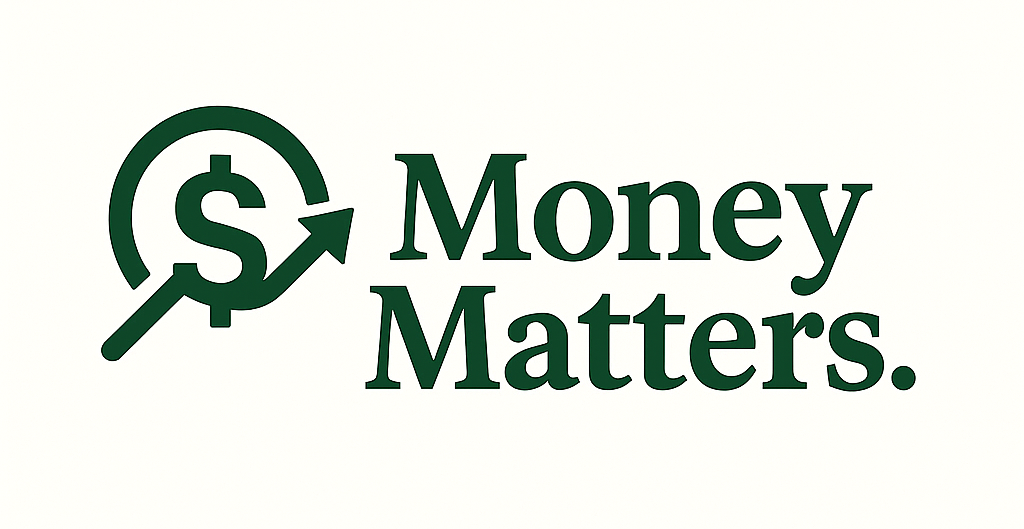Where Can I Learn Financial Literacy?: A Friendly Guide to Getting Started

Understanding your money might seem complicated, but learning about financial literacy doesn’t have to be. Whether you’re
just starting out or looking to sharpen your skills, there are more free and helpful resources than ever before to guide you. And the best
part? You don’t have to be a math whiz or financial expert to begin.
Let’s walk through the best places to learn—and what to avoid—so you can start building your financial confidence today.
What is Financial Literacy
Financial literacy means knowing how to manage your money well. It includes things like budgeting, saving, investing, understanding credit, and planning for big life events like college or retirement. You don’t have to learn everything all at once—just start with what’s most relevant to your life right now.
The Best Places to Learn-For Free
You don’t need to spend a fortune to become financially savvy. Here are some reliable, accessible places to begin:
1. Public Government Resources
Government websites offer free, non-biased, and up-to-date financial education materials. These tools are especially helpful because they’re created to help you—not to sell you anything.
Here are some trustworthy sources:
MyMoney.gov - Offers free guides on everything from budgeting to saving for retirement.
Consumer Financial Protection Bureau (CFPB) - Provides free tools, articles, and worksheets on money topics including debt, housing, and credit.
IRS Taxpayer Education – Explains how taxes work and what deductions you may qualify for.
2. MoneyMatters. Free Financial Tools
If you’re looking for a simple, hands-on way to start, the MoneyMatters website* offers free calculators to help you budget, plan investments, and get ready for retirement. These tools are designed for everyday people—not financial pros—and you don’t need to share personal information or download anything.
Whether you’re figuring out how to stretch your monthly paycheck or exploring how much to save for the future, these tools guide you step by step. It's a great way to learn by doing.
3. Online Courses and Tutorials
Free courses from sites like Khan Academy, Coursera, and edX can walk you through essential money topics at your own pace. You can start with the basics and build up to more complex topics over time.
4. Libraries and Community Workshops
Many public libraries and local organizations host free financial literacy workshops. These sessions are a great way to ask questions and learn in a supportive environment.
A Word of Caution: Be Careful Where You Get Advice
It’s natural to turn to friends or family for money advice—but personal finance is just that: personal. What works for one person might not be right for you.
For example, your friend may suggest taking out a car loan because it worked for them—but they may have better credit, more income, or fewer financial obligations. Taking the same approach without fully understanding your situation can lead to long-term stress or debt.
Instead, lean on trusted resources designed to educate—not to sell or assume.
One Real-Life Success Story
Olivia, a recent college grad, realized she knew very little about how to manage her money. She started using a free budgeting calculator on MoneyMatters and watched a few short videos from MyMoney.gov. Within a few weeks, she created a budget, set up automatic savings, and even started a small retirement fund. Now, she feels more in control of her future—and far less anxious about money.
Start Small, Start Now
Learning about money doesn’t have to be overwhelming. Pick one trusted resource. Spend just 15 minutes a week learning. Try out a calculator. Ask questions from credible sources.
The sooner you start, the more empowered you’ll feel—and the better your financial future will look.
Your journey to smarter money choices starts here. And it starts today.
